
Artificial Intelligence (AI) is
rapidly shaping the global
economy, revolutionising sectors from healthcare to education to manufacturing to finance. India is well positioned to leverage its dominant presence in the tech sector with the added
advantage of a massive population of young and skilled professionals.
As the nation continues to leverage its strengths in technology and innovation,
AI development in India holds immense potential for transformative growth across various sectors.
The Indian AI market is projected to reach approximately `66,400 crore by 2025, growing at an impressive compound annual growth rate (CAGR) of over 40%
from 2020 to 2025. Several key sectors have been quick to get off the blocks to integrate AI into their workflows but India faces several key challenges as well, which can be overcome through government initiatives for harnessing the potential of AI-driven
development. In 2020, Prime Minister Narendra
Modi laid out his vision for the development of the AI sector in India. “We want
India to become a global hub for AI. Many Indians are already working on AI
solutions across the world. India has also led the way in using technology for
development and ensuring the digital divide is bridged,” said Modi at the Responsible AI For Social Empowerment
(RAISE) summit.
The Evolution Of AI In India
India’s AI journey began with the growth of its Information Technology (IT) sector in the 1990s with computerisation and liberalisation of the telecommunications sector.
By the turn of the millennium, India became known globally for providing IT services and software development at competitive costs, leading to US and Europebased companies outsourcing significant
amounts of development work to Indian IT companies. The early noughties saw the emergence of a large number of companies across India catering to the needs of their offshore clients. This laid a strong foundation to embrace the next wave of technological evolution—Artificial Intelligence.
In the past decade, AI has transitioned
from being an experimental concept in India to becoming a critical component of business
operations, governance, and research. Large multinational corporations such as Google, Microsoft, IBM, and Amazon have set up AI research and development (R&D) centres in India. Indian IT giants such as Infosys, TCS, and Wipro are also building AI capabilities to compete globally. These blue-chip IT companies with access to a vast talent pool of skilled
professionals are positioned to lead India into the AI age.
The rise of AI-focused startups further demonstrates India’s commitment to AI. These startups, particularly in cities like Bengaluru, Hyderabad, and Pune, which have well-established IT clusters, are leverag
India’s AI journey began
with the growth of its Information Technology
(IT) sector in the 1990s with computerisation and liberalisation of the telecommunications sector. By the turn of the millennium, India became
known globally for providing IT services and software development at competitive costs
ing machine learning, natural language processing (NLP), and computer vision to create innovative solutions across multiple industries. According to a 2022 report by the National Association of Software and Service Companies (NASSCOM) [see box], India’s AI startup ecosystem witnessed a significant
rise in investments in recent years.
Key Sectors Experiencing AI Integration
● Healthcare
India’s healthcare sector has been rapidly adopting AI to address systemic challenges
such as underfunding, shortages in skilled professionals, and access issues in rural areas. AI is being used to enhance
READY FOR THE NEXT LEAP: NASSCOM
ANASSCOM report on the Indian AI startup ecosystem provides significant insights into the rapid growth and development of AIdriven innovation in India. Some of the key findings from recent
reports include:
● The number of AI startups in India has grown significantly in the past few years. As of 2022, there were over 1,000 AI startups in
the country, showing a robust increase from previous years. These startups are involved in various domains like healthcare, agriculture,
retail, and fintech.
● Investments in AI startups have seen a sharp rise, reflecting growing investor confidence. The Indian AI startup ecosystem witnessed a 30% CAGR in funding over 2017-2022. The cumulative funding for AI startups in India has crossed over $1 billion.
● Despite global market fluctuations, AI-focused investments in India remained strong, with significant capital flowing from both domestic and international investors, including venture capitalists and technology giants.
● AI startups in India are focusing on diverse sectors, with the top areas of growth being healthcare where AI-powered diagnostic tools,
patient management systems, and telemedicine solutions are already in
use, agriculture where precision farming, crop monitoring and AI-based
yield optimisation platforms are being aided, and fintech where credit scoring, fraud detection, and personalised financial services all use AI.
● Many Indian AI startups are working with deep technologies like Natural Language Processing (NLP), Computer Vision, Machine
Learning (ML), and Robotic Process Automation (RPA). There has been a noticeable surge in the development of speech recognition and AIdriven decision-making technologies.
● Several AI startups in India are not only making an impact domestically but also expanding globally. Many Indian companies are
now partnering with international firms and scaling their AI solutions
abroad, particularly in the US, Europe, and Asia-Pacific markets.
● The Indian government’s initiatives, such as Digital India, Startup India, and the National AI Strategy, have played a vital role in supporting the AI ecosystem. Public-private partnerships and government-backed incubators are helping startups in early-stage
development and commercialisation.
● Programmes like RAISE (Responsible AI for Social Empowerment) have provided a platform for AI startups to showcase their work and collaborate with global AI communities.
● The availability of AI talent in India is on the rise, supported by a strong emphasis on AI-related education and skill development programmes. Initiatives like AI for Youth and various skilling programmes run by both government and private organisations are nurturing a large pool of AI developers and engineers.
● Many startups are focused on AI for social empowerment, with
projects in healthcare, education, and agriculture aimed at solving real-world problems. The report emphasised the growth of AI solutions for rural areas, affordable healthcare, and AI’s potential for improving
governance and public services.
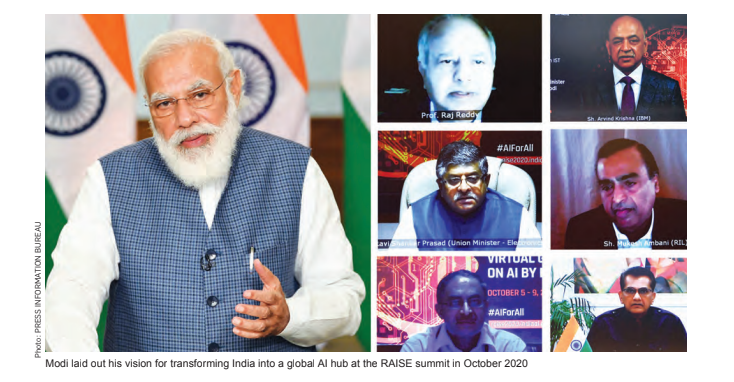
diagnostics, optimise treatment plans, and provide personalised healthcare solutions. For instance, companies like Niramai Health Analytix are using AI-based thermal imaging technology for breast cancer screening, providing a non-invasive and accurate diagnostic tool. AI-powered chatbots and telemedicine platforms are also helping patients receive timely medical advice, especially in underserved regions. Similarly, Sigtuple, a health-tech startup, has automated the analysis of biological
Agriculture remains
the backbone of India’s
economy, employing close
to 50% of the workforce.
However, the sector faces
numerous challenges, such
as unpredictable weather
conditions, inefficient
farming practices, and
fragmented supply chains.
Artificial Intelligence is
being deployed to meet
these challenges
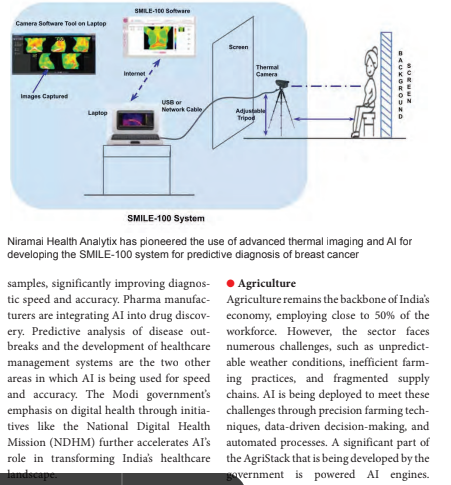
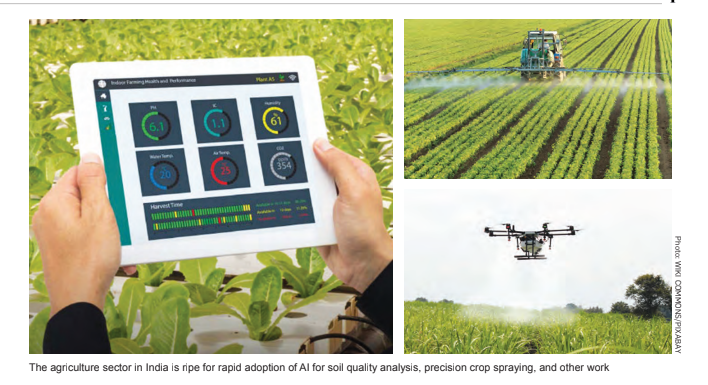
AI-driven platforms are being used for soil health analysis, crop monitoring, pest detection, and weather forecasting, all of which help farmers optimise their yields
and reduce resource wastage. For instance, startups like Intello Labs are using AI for image-based solutions to assess crop quality, while CropIn provides AI-powered
insights to farmers on crop management. AI applications in agriculture can also enhance supply chain efficiency by predicting demand and improving logistics. By
providing real-time data, AI helps farmers make informed decisions and reduce post-harvest losses, contributing to higher
incomes and more sustainable farming
practices.
● Manufacturing
The manufacturing sector in India is witnessing a digital revolution with the adoption of AI technologies. Industry 4.0, which emphasises automation, data exchange, and AI-driven operations, is
gaining traction across manufacturing
industries in India.
AI-powered machines and robotics are optimising production processes,
improving quality control, and enhancing operational efficiency. Predictive maintenance using AI reduces downtime and
lowers maintenance costs, while computer vision technologies are being used to inspect product quality in real time.
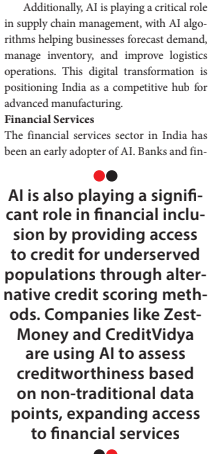
tech companies are increasingly using AI to
enhance customer service, manage risks, and optimise operations. AI is helping to improve fraud detection, credit scoring, and personalised financial services. Chatbots and virtual assistants are becoming commonplace,
providing customers with 24/7 assistance and improving user experience. For example, State Bank of India (SBI), India’s largest
public sector bank, has implemented YONO, an AI-driven platform that integrates banking and lifestyle services. AI is also playing a significant role in
financial inclusion by providing access to credit for underserved populations through alternative credit scoring methods. Companies like ZestMoney and CreditVidya are using AI to assess creditworthiness based on non-traditional data points, expanding access to financial services for the unbanked.
● Education
AI’s integration into education is helping bridge gaps in India’s traditional learning system. With the massive scale of the Indian education system, AI can provide personalised learning experiences, automate administrative tasks, and improve educational outcomes.
AI-driven learning platforms like

Embibe are tailoring educational content to
individual students’ needs, providing them with personalised recommendations and
feedback. AI is also helping in automating administrative tasks like grading and attendance, allowing educators to focus more on teaching and mentoring. Additionally, AI can democratise access
to education, especially in rural areas, through online learning platforms and virtual classrooms. The National Education Policy (NEP) 2020 recognises the potential of AI in transforming education and emphasises its integration into the curriculum.
Government Initiatives And Policies
Recognising the transformative potential of AI, the Indian government has undertaken several initiatives to promote AI development across sectors. These initiatives focus on research, skilling, and creating a conducive ecosystem for AI innovation. Though the government’s AI policy framework is still a workin-progress, it has a defining role in determining the trajectory of growth of the
AI sector.
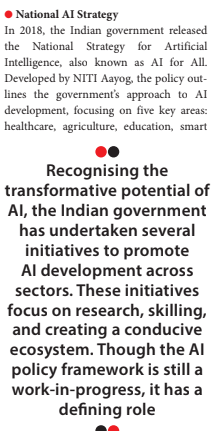
cities, and infrastructure. The strateg emphasises AI’s potential to drive inclusive
growth and improve public service delivery.The National AI Strategy promotes collaboration between industry, academia,
and the government to accelerate AI adoption. It also highlights the need for ethical AI frameworks and governance.
● Responsible AI For Youth
Launched in 2020, the Responsible AI for Youth initiative aims to introduce students in India to AI and equip them with the necessary skills to thrive in the AI-driven future. This programme provides AI training and tools to students from Classes 8 to
12, fostering a culture of innovation and creativity at an early age.
● Research And Development Centres
To bolster AI research, the government has established various R&D centres in partnership with academic institutions and industry players. The Centre of Excellence in AI, set up in 2019 by the Ministry of Electronics and Information Technology (MeitY), is
one such initiative that fosters research in
AI and supports startups working on AI-driven innovations.
● AI in Governance
India is increasingly using AI in governance to improve public service delivery. For example, AI-powered systems are being used for facial recognition in security, predictive policing, and citizen grievance redressal. The government’s digital initiatives, such as Digital India and Smart
Cities, are leveraging AI to make public services more efficient and accessible.
Challenges To AI Development In India
Despite the promising developments, India faces several challenges in fully realising the potential of AI. The availability of quality data is, perhaps, the biggest challenge. AI relies heavily on data, and while India is generating massive amounts of data, there is a need for better data infrastructure
and quality control mechanisms. The lack of standardised, annotated datasets is a significant hurdle in AI development. For this the government needs to come up with data
taxonomy that will go a long way in data standardisation. Equally important is data
accessibility. The government should focus
its attention on scaling up the Open Government Data (OGD) Platform and create cheap APIs for developers. Experts suggest that going down the open source
route is the best option for India. Skilled workforce is another challenge that needs attention. While India has a large talent pool of engineers and data scientists,
there is still a shortage of specialised AI expertise. Upskilling the workforce and promoting AI education is crucial to bridge this gap. One way to address this challenge would be to introduce an AI curriculum in schools so that young students get exposed to the basics of AI in the early stages of their learning experience. The digital divide, particularly in rural
areas, poses a challenge to AI adoption. Enhancing internet connectivity, cloud
infrastructure, and computing power is essential for widespread AI deployment. For this the government needs to make capital investment in public IT and data infrastructure at the grassroots level. Equally important is addressing the
emerging ethical and regulatory concerns. As AI becomes more pervasive, there is a need for robust ethical and regulatory
frameworks to address concerns around privacy, bias, and the potential misuse of AI
technologies. However, care should be taken to ensure that the regulatory framework is not restrictive for the development of the AI ecosystem.
The Future Of AI In India
The future of AI development in India
looks promising. With continued government support, investments in research, and a focus on skill development, India can become a global hub for AI innovation as envisioned by Modi. The potential for
AI to drive economic growth, improve
The government needs
to come up with data
taxonomy that will help
in data standardisation.
Equally important is
data accessibility. The
government should focus
its attention on scaling
up the OGD Platform
and create cheap APIs
for developers. Experts
suggest going down the
open source route
public services, and foster inclusive development is immense. However, for India to fully capitalise on AI’s potential, it must
address the challenges of infrastructure, data governance, and ethical frameworks. A liberalised policy driven approach will
provide confidence to the private sector to make investments in areas like research and development (R&D) and product
development. As AI continues to evolve, India’s journey toward becoming a leader in the global AI landscape will depend on its ability to harness the technology for social good,
ensuring that AI benefits all segments of society
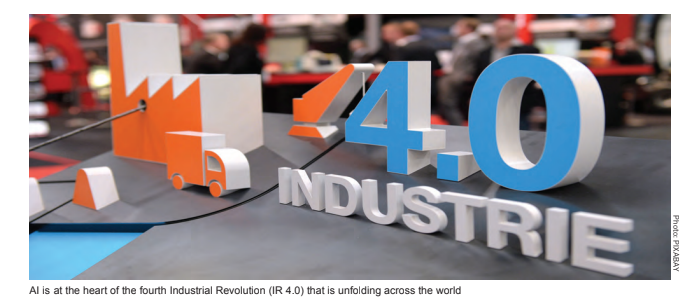


Add Comment